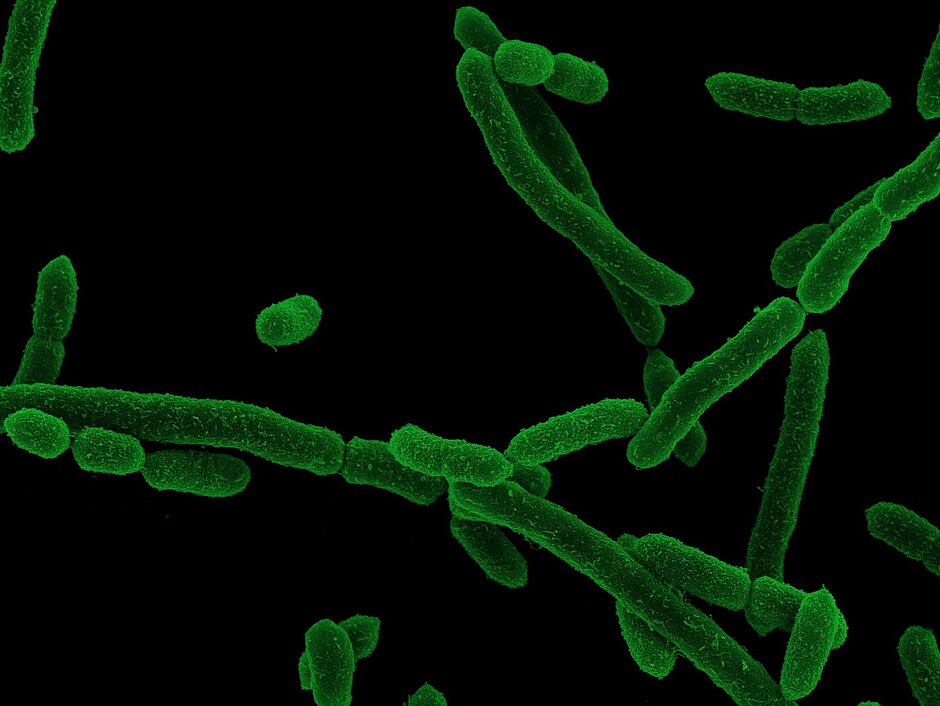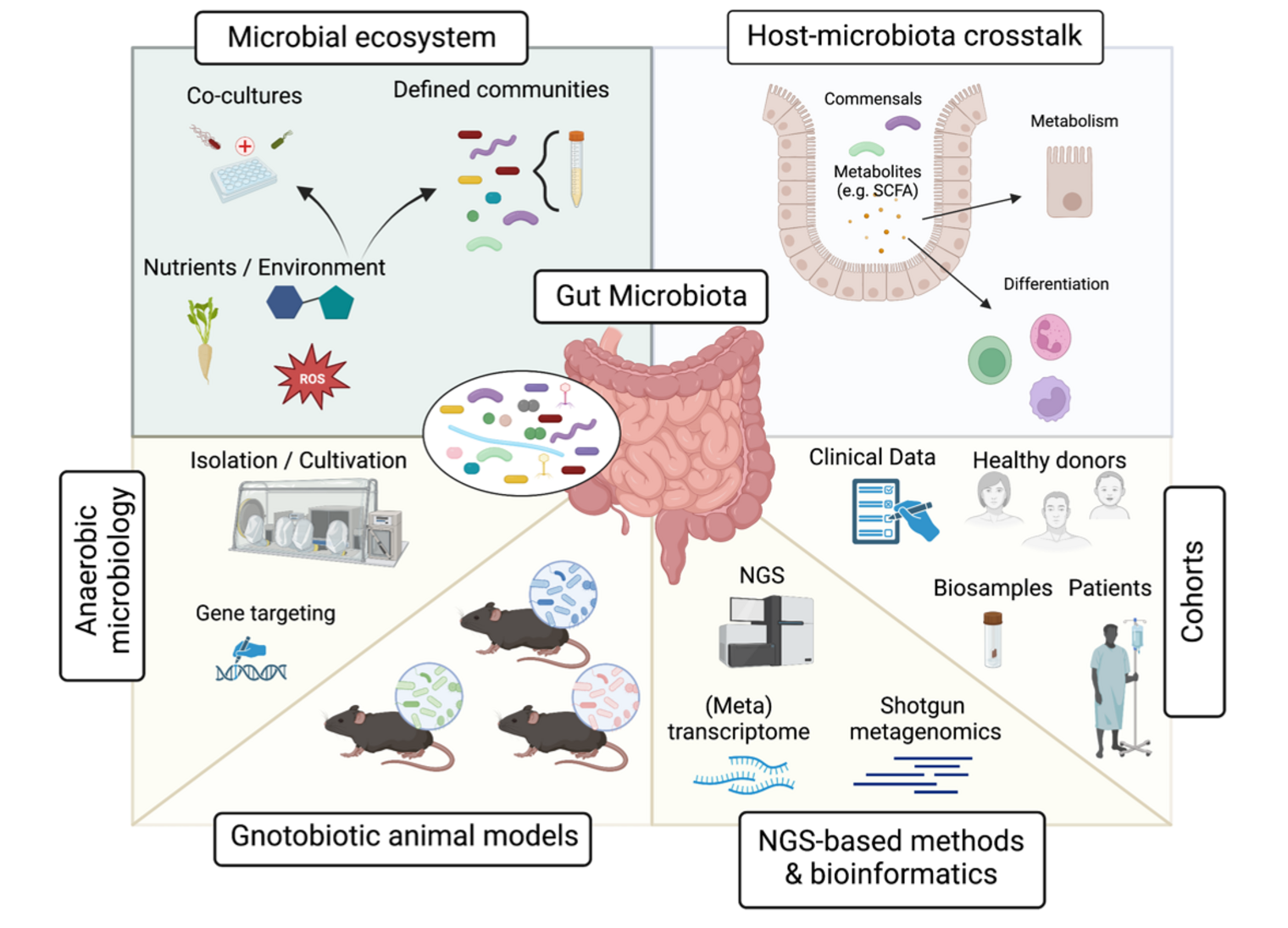
Infection Biology

Research Focus
Despite great progress and important results in microbiome research in recent years, the translation of these findings into novel drugs is still in the early stages, as it is often unknown which members of the microbiome and which specific mechanisms are responsible for the health-promoting and health-damaging effects. Therefore, in recent years we have developed methods and models that allow us to analyze the complex interplay between pathogens, the microbiome and the host in order to gain new insights into how the manipulation of microbial communities can be used therapeutically. We have focused on two areas in particular: firstly, the role of widespread but as yet uncharacterized members of the gut microbiome in the microbial ecosystem and secondly, harnessing the potential of components of the microbiome to promote the exclusion of multidrug-resistant enterobacteria such as Klebsiella pneumoniae and Escherichia coli from the gut. By combining basic and translational research, we aim to fully exploit the potential of the microbiome as a biomarker and therapeutic target.
Research Focus
Despite great progress and important results in microbiome research in recent years, the translation of these findings into novel drugs is still in the early stages, as it is often unknown which members of the microbiome and which specific mechanisms are responsible for the health-promoting and health-damaging effects. Therefore, in recent years we have developed methods and models that allow us to analyze the complex interplay between pathogens, the microbiome and the host in order to gain new insights into how the manipulation of microbial communities can be used therapeutically. We have focused on two areas in particular: firstly, the role of widespread but as yet uncharacterized members of the gut microbiome in the microbial ecosystem and secondly, harnessing the potential of components of the microbiome to promote the exclusion of multidrug-resistant enterobacteria such as Klebsiella pneumoniae and Escherichia coli from the gut. By combining basic and translational research, we aim to fully exploit the potential of the microbiome as a biomarker and therapeutic target.
Prof Dr Till Strowig
Humans are carriers of diverse microbial ecosystems that influence our daily life. To understand our interactions with these ecosystems we need model systems that allow experimental manipulations of both the host and the microbes.

Till Strowig studied Medical Biotechnology at the “Technische Universität” Berlin. After his diploma thesis at The Rockefeller University in New York, he remained there for his Ph.D. thesis supported by a fellowship from the Boehringer Ingelheim Foundation. He continued his scientific training in the laboratory of Richard Flavell at Yale University supported by a postdoctoral fellowship from the Leukemia and Lymphoma Society. Since June 2013, Till Strowig is heading the Young Investigator Group “Microbial Immune Regulation“ at the HZI, which has grown into the department of the same name since February 2019.
Projects
Interindividual differences in the (gut) microbiota are recognized as key factors determining the clinical outcome of various infectious and immune-mediated diseases. Using germ-free and gnotobiotic mouse models, we have recently shown that the microbiota can influence susceptibility to bacterial infections and that customized microbiome editing can be used to reduce susceptibility (Osbelt et al. 2021). Furthermore, by analyzing the microbiota in combination with metabolomics and the isolation of candidate bacteria, we were able to identify bacterial species that have the ability to modulate mucosal and systemic immune responses (Zhao et al. 2023), as well as candidate species that lead to altered courses of immune-mediated diseases (Iljazovic et al. 2021). Current projects focus on investigating the exact molecular mechanisms responsible for the interaction between pathogens and the microbiota and how targeted modification of the microbiota through novel antibiotics (Bullitz et al. 2023), addition of probiotic bacteria or dietary changes (Siracusa et al. 2023) can be used to promote health.
Team
Until the building is completed, the group is based at the HZI campus. You can find the current team list here.
Publications
- Siracusa F, Schaltenberg N, Kumar Y, Lesker TR, Steglich B, Liwinski T, Cortesi F, Frommann L, Diercks BP, Bönisch F, Fischer AW, Scognamiglio P, Pauly MJ, Casar C, Cohen Y, Pelczar P, Agalioti T, Delfs F, Worthmann A, Wahib R, Jagemann B, Mittrücker HW, Kretz O, Guse AH, Izbicki JR, Lassen KG, Strowig T, Schweizer M, Villablanca EJ, Elinav E, Huber S, Heeren J, Gagliani N. Short-term dietary changes can result in mucosal and systemic immune depression. Nat Immunol. 2023 Sep;24(9):1473-1486. https://doi.org/10.1038/s41590-023-01587-x.
- Zhao B, Osbelt L, Lesker TR, Wende M, Galvez EJC, Hönicke L, Bublitz A, Greweling-Pils MC, Grassl GA, Neumann-Schaal M, Strowig T. Helicobacter spp. communities are prevalent in wild mice and protect from lethal Citrobacter rodentium infection in absence of adaptive immunity. Cell Reports 2023 May;42(6):112549. https://doi.org/10.1016/j.celrep.2023.112549 .
- Bublitz A, Brauer M, Wagner S, Hofer W, Musken M, Deschner F, Lesker TR, Neumann-Schaal M, Paul LS, Nubel U, Bartel J, Kany AM, Zuhlke D, Bernecker S, Jansen R, Sievers S, Riedel K, Herrmann J, Muller R, Fuchs TM*, Strowig T*. The natural product chlorotonil A preserves colonization resistance and prevents relapsing Clostridioides difficile infection. Cell Host Microbe 2023 Apr 18; https://doi.org/10.1016/j.chom.2023.04.003.
- P. Riese, S. Trittel, M. K. Akmatov, M. May, J. Prokein, T. Illig, C. Schindler, B. Sawitzki, Y. Elfaki, S. Floess, J. Huehn, A. J. Błażejewski, T. Strowig, E. A. Hernandez-Vargas, R. Geffers, B. Zhang, Y. Li, F. Pessler and C. A. Guzmán. Distinct immunological and molecular signatures underpinning influenza vaccine responsiveness in the elderly. Nat Commun. 2022 Nov 12;13 (1): 6894. https://doi.org/10.1038/s41467-022-34487-z .
- Osbelt L, Wende M, Almasi E, Derksen E, Muthukumarasamy U, Lesker TR, Galvez EJC, Pils MC, Schalk E, Chhatwal P, Farber J, Neumann-Schaal M, Fischer T, Schluter D, Strowig T. Klebsiella oxytoca causes colonization resistance against multidrug-resistant K. pneumoniae in the gut via cooperative carbohydrate competition. Cell Host Microbe 2021 Nov 10;29(11):1663-1679 e1667. https://doi.org/10.1016/j.chom.2021.09.003.



